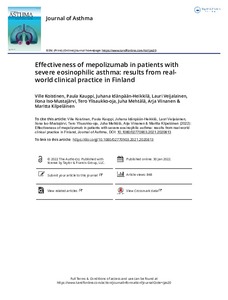Effectiveness of mepolizumab in patients with severe eosinophilic asthma: results from real-world clinical practice in Finland
Koistinen Ville; Kauppi Paula; Idänpään-Heikkilä Juhana; Veijalainen Lauri; Iso-Mustajarvi Ilona; Ylisaukko-Oja Tero; Mehtala Juha; Viinanen Arja; Kilpeläinen Maritta
https://urn.fi/URN:NBN:fi-fe2022081153973
Tiivistelmä
Objectives: Mepolizumab treatment provides clinical benefits for patients with severe eosinophilic asthma in randomized controlled trials. However, real-world data for patients in Finland are lacking.
Methods: This retrospective, non-interventional, chart review study included patients with severe eosinophilic asthma ≥18 years of age initiating mepolizumab between January 1, 2016 and January 31, 2019 at three investigational sites in Finland. Patient characteristics during the 12 months prior to mepolizumab initiation (baseline) were recorded and primary and secondary endpoints included changes from baseline in disease outcomes during follow-up (up to 24 months following mepolizumab initiation). Exploratory endpoints included association between patient characteristics and exacerbation frequency/annual cumulative oral corticosteroid (OCS) dose.
Results: Overall, 51 patients were included (mean 17.8 months follow-up). At baseline, patients had a mean (standard deviation) blood eosinophil count of 550 (410) cells/µL; impaired lung function and health-related quality of life; poor symptom control; frequent exacerbations (2.78/year); and 90% were using OCS (mean: 9.80 mg/day). At the last follow-up visit, reductions from baseline in blood eosinophil count (84%) and fractional exhaled nitric oxide (26%) were observed, as were improvements in Asthma Quality of Life Questionnaire score (36%) and Asthma Control Test score (34%). Reductions in the mean number of annual exacerbations (82%) and mean daily OCS dose (39%) were also seen; reductions were observed even after adjustment for several patient baseline characteristics.
Conclusions: Results are consistent with previous randomized clinical trials, indicating that Finnish patients experience clinically relevant improvements when treated with mepolizumab in real-world clinical practice.
Kokoelmat
- Rinnakkaistallenteet [27094]
